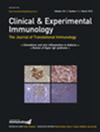以表达 T-bet 的 B 细胞为目标,对自身免疫进行治疗干预。
IF 3.4
3区 医学
Q3 IMMUNOLOGY
引用次数: 0
摘要
转录因子 T-bet 除了是 Th1 系的承诺调节因子外,还在其他免疫细胞类型中表达,从而协调它们的功能。更具体地说,在 B 细胞中,T-bet 负责它们向特定 IgG 亚类(小鼠为 IgG2a/c,人类为 IgG1/3)的同种型转换。在系统性红斑狼疮和/或类风湿性关节炎等各种自身免疫性疾病中,表达 T-bet 的 B 细胞亚群(即年龄相关 B 细胞(CD19+CD11c+CD21-T-bet+)和/或双阴性 B 细胞(CD19+IgD-CD27-T-bet+))会出现扩张,似乎是疾病发病机制的驱动因素。根据大多数来自自身免疫小鼠模型的数据,针对这些特定的 B 细胞群能够改善自身免疫受试者的总体健康状况。在这篇综述文章中,我们介绍了针对患有自身免疫疾病的小鼠和人类的各种治疗方法,并讨论了每种方法对 T-bet+ B 细胞的影响。总之,我们强调了专门针对 T-bet+ B 细胞对自身免疫疾病进行治疗干预的重要性。本文章由计算机程序翻译,如有差异,请以英文原文为准。
Targeting T-bet expressing B cells for therapeutic interventions in autoimmunity.
Apart from serving as a Th1 lineage commitment regulator, transcription factor T-bet is also expressed in other immune cell types and thus orchestrates their functions. In case of B cells, more specifically, T-bet is responsible for their isotype switching to specific IgG sub-classes (IgG2a/c in mice and IgG1/3 in humans). In various autoimmune disorders, such as systemic lupus erythematosus and/or rheumatoid arthritis, subsets of T-bet expressing B cells, known as age-associated B cells (CD19+CD11c+CD21-T-bet+) and/or double-negative B cells (CD19+IgD-CD27-T-bet+), display an expansion and seem to drive disease pathogenesis. According to data, mostly derived from mice models of autoimmunity, the targeting of these specific B cell populations is capable of ameliorating the general health status of the autoimmune subjects. Here, in this review article, we present a variety of therapeutic approaches for both mice and humans, suffering from an autoimmune disease, and we discuss the effects of each approach on T-bet+ B cells. In general, we highlight the importance of specifically targeting T-bet+ B cells for therapeutic interventions in autoimmunity.
求助全文
通过发布文献求助,成功后即可免费获取论文全文。
去求助
来源期刊
CiteScore
8.40
自引率
2.20%
发文量
101
审稿时长
3-8 weeks
期刊介绍:
Clinical & Experimental Immunology (established in 1966) is an authoritative international journal publishing high-quality research studies in translational and clinical immunology that have the potential to transform our understanding of the immunopathology of human disease and/or change clinical practice.
The journal is focused on translational and clinical immunology and is among the foremost journals in this field, attracting high-quality papers from across the world. Translation is viewed as a process of applying ideas, insights and discoveries generated through scientific studies to the treatment, prevention or diagnosis of human disease. Clinical immunology has evolved as a field to encompass the application of state-of-the-art technologies such as next-generation sequencing, metagenomics and high-dimensional phenotyping to understand mechanisms that govern the outcomes of clinical trials.

 求助内容:
求助内容: 应助结果提醒方式:
应助结果提醒方式:


